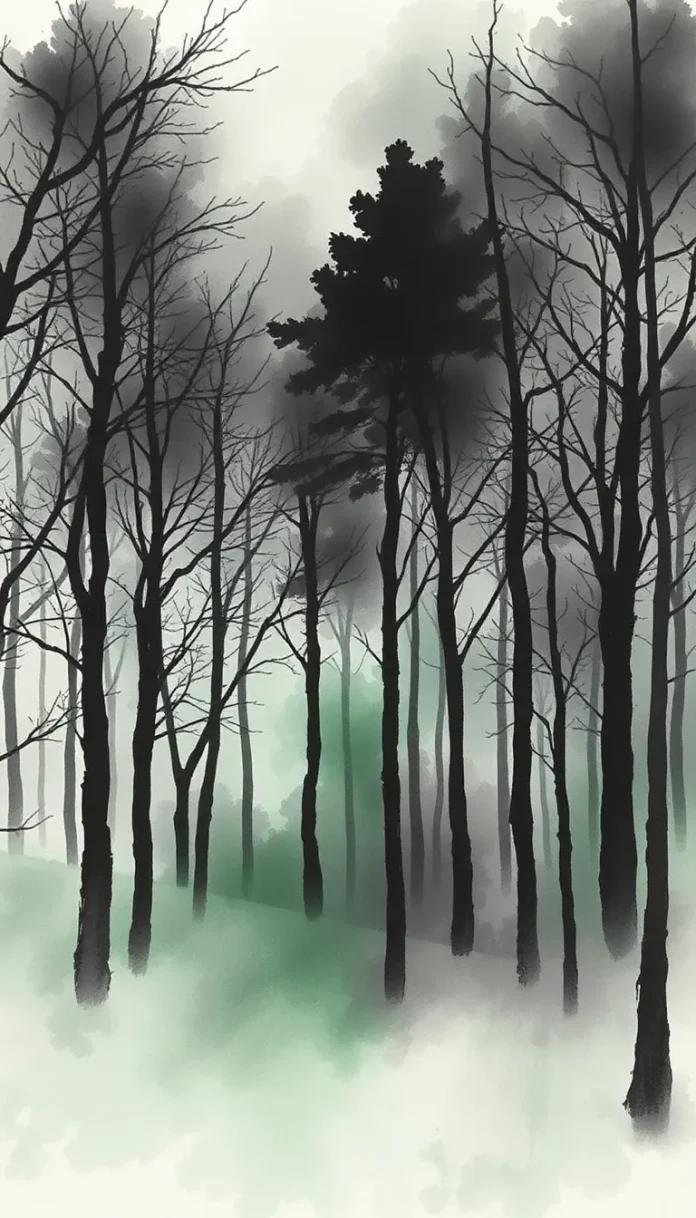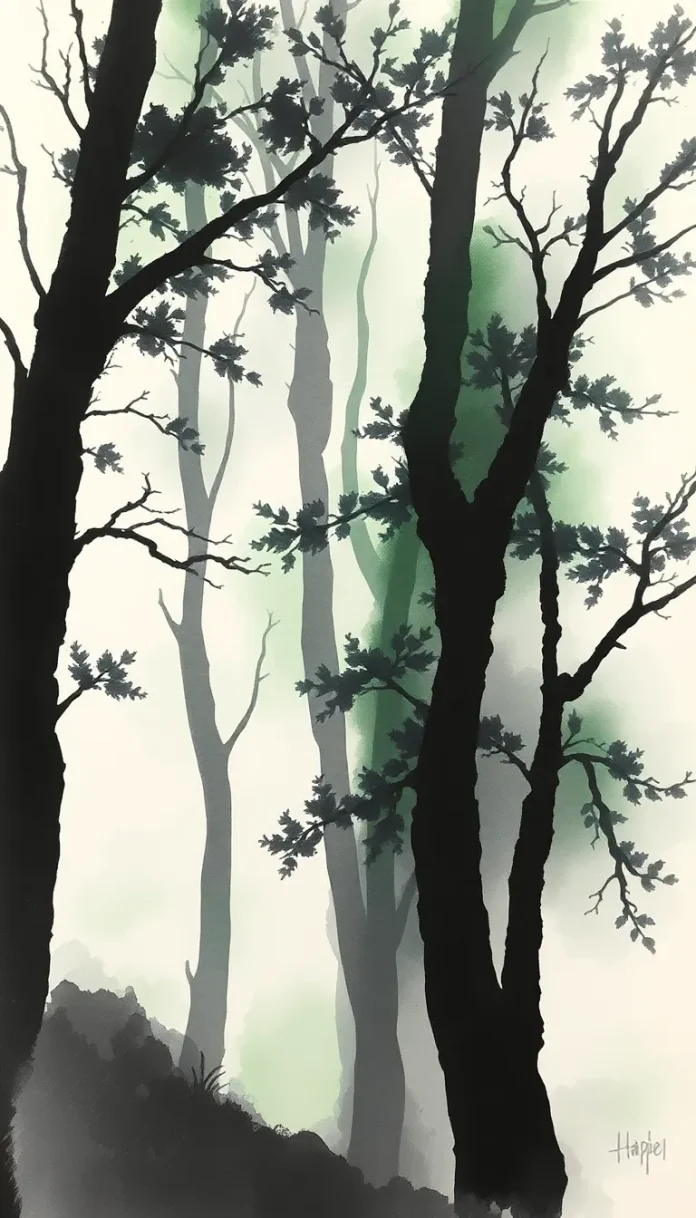The Solitary Pilgrim of the Misty Bridge
Beneath the ghostly luminescence of a timid moon, the bridge beckoned like an archaic threshold to realms of memory and myth. The stones, aged and smoothed by the passage of countless seasons, murmured in a language lost to time—a silent elegy that resonated with the very spirit of isolation. Here, where the boundary of earth and ether blurred, the solitary traveler engaged in a silent dialogue with fate, each step a verse in a ballad of inevitable regret.
I.
Upon the foggy banks, beneath the shroud of dew and whispered secrets, the Voyageur paused to contemplate the chimeric interplay of nature and destiny. His countenance, framed by the soft luminescence of distant stars, betrayed both resilience and a wistful sorrow. “O ancient bridge,” he murmured, his voice scarcely a ripple in the tranquil night, “thy stones, which have borne witness to epochs of joy and despair, dost thou hold the answers of my solitary plight?”
The bridge, like a silent sentinel, bore witness to the soul’s journey—a mirror reflecting the myriad complexities of human existence. Each stone, etched with the scars of ancient tempests and unvoiced laments, echoed the quiet truth: Life, in all its ephemeral beauty, is a passage steeped in transient splendor and inevitable loss. And so, in the interplay between shadow and mist, the traveller’s inner lament entwined with the murmurs of the age-old structure.
II.
Steeped in reflective melancholy, the Voyageur recalled a lifetime of unfulfilled hopes—a tapestry woven from threads of despair and fleeting moments of luminous joy. With weary eyes, he beheld the ephemeral glimmer of memories past, as if one might uncover truth in the delicate interplay of light and darkness. His mind, a repository of silent tragedies and ephemeral triumphs, wandered through the corridors of yesteryear, where every step seemed to summon both beauty and sorrow.
On the far bank, enshrouded in an ephemeral haze, lay the vestiges of a forgotten village, its ruined silhouettes a testament to the relentless march of time. There, nested amid the vestiges of a bygone era, lay the fragments of laughter, passion, and fervent dreams—now rendered mute by the inexorable hand of fate. The solitary traveller, through the dim veil of memory, traced the outlines of lives intermingled with his own solitude, recognizing in their ephemeral echoes a kinship with his own muted despair.
III.
As the journey advanced, the bridge itself seemed to become a living parable of the human soul: a liminal space where hope and despair coexisted in insidious harmony. The mist, a spectral shroud, enfolded the arch in mysteries as profound as the unfathomable depths of a heart left barren by lost dreams. In the cold embrace of the night, the figure of the Voyageur appeared both diminished and exalted—a solitary beacon of existential yearning adrift in a sea of ceaseless isolation.
In quiet moments of introspection, the traveller questioned the nature of his passage. “Am I but a transient shade upon this ancient span?” he whispered, his voice melding with the rustling wind. “Perhaps, my journey is a mirror, reflecting the timeless solitude of every beating heart, and the futile quest to grasp that which is ever beyond the mortal ken.” In these musings lay a profound recognition of his transient nature—a fragile existence destined to vanish like a wraith amid the twilight of forgotten dreams.
IV.
Emboldened by the silent allure of the mist and the monumentality of the bridge, the Voyageur embarked further, his gait carrying the weight of innumerable lifetimes. With every resonant footfall, the ancient stones whispered chronicles of sorrow and splendor, recounting tales of wanderers much like himself—souls who, in their solitude, sought the transcendent and the eternal amidst the ephemeral. The soft cadence of his steps evoked the ticking of an unseen clock, marking the inexorable progression of time—a reminder of the fleeting nature of terrestrial existence.
At mid-bridge, where the falling fog waned to reveal a spectral dance of ivy and stone, the air grew thick with the poignancy of unspoken stories. Here, the traveller paused, and his weary eyes beheld a vision—a procession of apparitions, each rendered in the delicate hues of melancholic reminiscence. They were the echoes of lives once passionate and vibrant, now dissolved into the ethereal mists like fleeting dreams. Their silent parley with his own despair lent him the bitter taste of inevitable solitude, yet within this communion, he discovered an unsettling kinship with the eternal melancholy that bound them all.
V.
In a rare soliloquy to the silent night, the Voyageur spoke thus to the unseen spirits of the bridge: “I, adrift in the labyrinth of my solitary existence, am naught but a transient whisper, a solitary note in the symphony of time. With every step, as the pallid fog unveils the forlorn path of destiny, I am reminded that the human heart, ensnared in the web of impermanence, is destined to yearn for what lies eternally out of reach.”
His words, though veiled in despair, resonated with a truth that was as inevitable as the waxing and waning of the distant lunar glow. In that moment of stark vulnerability, the ancient stones seemed to pulse with an uncanny vitality, each chiseled line and crevice echoing the innate fissures of a broken heart. The bridge spoke of transience, of memories lost in the relentless tide of time, and of the indelible mark left by souls condemned to a ceaseless wander.
VI.
With the passing hours and the inexorable approach of dawn, the mist began to yield to the clarion call of the rising sun. Yet, in its brief reprieve, the glimmering rays revealed not hope, but rather the immutable consequence of a life steeped in isolation. The tender illumination seemed to underscore the cruel irony of the traveller’s pilgrimage—a solemn truth that the very light which dispels the fog also casts a harsh scrutiny upon the solitude that encases his heart.
In the golden haze of the morning, the ancient bridge, bathed in the soft radiance of reluctant day, now appeared as an emblem of separation. On one bank, the fading vestiges of a life once filled with promise stood in silent testimony to what might have been, while on the opposing shore, the future lay shrouded in uncertainty and the pallor of sorrow. The path of the solitary voyager was thus laid bare—a continuum of loss, of unavailing quest for meaning, rendered raw by the caprice of fate.
VII.
As the journey neared its inevitable end, the Voyageur found himself drawn to a solitary alcove beneath a gnarled tree, whose branches reached skyward like desperate hands pleading for salvation. Here, in the tenuous interstice between memory and oblivion, he allowed the weight of existence to overwhelm him. The soft susurration of the wind through ancient limbs and the muted cadence of distant crooning birds lent him ephemeral solace, yet his soul remained adrift, ensnared in the inescapable web of existential solitude.
In quiet, plaintive dialogue with the empty air, he lamented: “My heart, a solitary wanderer, is caught in the silent storm of futility. In the embrace of this ancient bridge and amid the shrouded banks, I confront the stark reflection of my own impermanence—a truth that echoes with the bitterness of bygone regrets and the melancholic tasks of endless memory.” His voice, imbued with a fragile hope, sought to summon in the void the revelations of an unburdened spirit, yet the spectral silence offered naught in return but the immutable decree of desolation.
VIII.
Under the vast expanse of a waning sky, where the interplay of light and shadow rendered the world a tapestry of bittersweet existence, the solitary traveller resumed his solemn trek. With each step upon the venerable stone, a cascade of reflections surged forth—an introspective river that wound its way through the labyrinth of the human heart. The bridge, acting as both battleground and sanctuary, bore silent witness to the halcyon yet tormenting pilgrimage of a man engaged in an eternal soliloquy with fate.
Yet amidst the relentless rhythm of solitude and the surging tide of inner agony, an ineluctable sorrow began to coil about his soul—a final, fated reckoning with the immutable truth that one’s journey, however intrepid and profound, is destined to conclude in the sepulchral embrace of despair. The profound melancholy of the ancient stone, set against the endless shroud of mist, foretold that the voyage of the heart would not escape the inevitable tragedy of isolation.
IX.
As the bridge reached its far end—a silent terminus where the shadow of the past melded with the untold whispers of the future—the Voyageur’s steps faltered and slowed. With neither destination nor comfort awaiting beyond, he sank onto the cold, unyielding stones, his eyes now windows to a landscape of irreversible desolation. Here, on the precipice of a life isolated by both time and fate, the whisper of the ancient stone became a requiem—a final lament for dreams surrendered to the inexorable void.
In the twilight of his reverie, he murmured softly to the interloping mists: “In thee, ancient guardian of forlorn paths, I discern the solitary rhythm of existence—a cadence that echoes with the mournful sighs of lost ambitions, and the relentless reminder of an unyielding destiny marked by isolation.” His voice, now a fragile murmur in the vast emptiness, lost itself in the symphony of echoes and the cadence of falling rain, a veil of sorrow that draped his spirit in the hues of melancholic resignation.
X.
Thus, the relentless passage of hours wove a tapestry of eternal sorrow upon the soul of the Voyageur. Despite the faint promise of a sun reborn in the distant sky, his inner vision remained trapped in the perpetual twilight of regret—a prison from which no fervent hope could ever emancipate him. The ancient bridge, its form now imbued with an aching memory of his solitude, witnessed the final descent of a spirit worn and labored by the ceaseless journey of human frailty.
In that ghastly moment of resignation, the shadows lengthened, and the solitary wanderer perceived the inescapable truth: his quest, marked by brief illuminations of beauty and sustained by the pervasive gloom of isolation, was fated to culminate in an irrevocable, dolorous end. Upon the cold stones of the bridge, with heart as brittle as the ancient mortar and eyes dimmed by the relentless anguish of lost possibility, the final notes of his solitary song faded into the encroaching gloom—a desolate melody that bore the unmistakable stain of tragedy.
In the quietude that followed, the bridge resumed its mute vigil over the fog-bound banks, holding within its ancient memory the somber tale of the solitary traveller—a tale inscribed in quiet despair, carved into the very tablet of the transient earth. It was a tale that spoke not of triumph but of inevitable sorrow—a eulogy to the fragile spirit of a man caught in the throes of a destiny as cold, unyielding, and tragic as the stone beneath his wearied feet.
XI.
In the final act of his quiet saga, as the first pale rays of day vainly tried to dispel the lingering specter of night, the Voyageur, beaten by the inexorable weight of his own fate, lifted his eyes to the heavens with a look not of defiance but of a resigned acceptance of life’s unalterable sorrow. “In solitude,” he softly intoned, “there lies the immutable truth of our mortal descent—a solitary sojourn through a labyrinth of despair, where, at every juncture, the tangible pain of isolation bespeaks the ephemeral nature of our brief sojourn on this terrestrial stage.”
The words, uttered with the solemnity of a final benediction, resonated with the forlorn cadence of a spirit long acquainted with the tragic limits of human aspiration. The ancient stones, steeped in the spectral mist, seemed to absorb his final expressions as one might a dying ember, whose glow, now diminished, heralds the end of a fragile life lived entirely in the shadow of inevitable demise.
XII.
And so, in the hallowed silence of that misty morn, the weary figure of the Voyageur lay in quiet repose upon the venerable stones—a poignant testament to the inescapable solitude that defines the human condition. His journey, marked by quiet introspection and haunted by the phantoms of lost time, had reached its irrevocable conclusion—a finale rendered in the unadorned shades of tragic destiny.
The ancient bridge, ever the silent chronicler of mortal fates, bore in its stone heart the record of one man’s endless pilgrimage—a pilgrimage that, like the transient dew upon its surface, had been destined from the very first step to vanish into the mists of sorrow and regret. The melancholic hush that ensued was not one of relief, but of a profound mourning for the fleeting essence of life itself—a quiet dirge for a soul forever consigned to the abyss of solitude.
Thus ended the fated journey of the solitary traveller, whose quiet existence, much like the fading echo of a mournful sonnet, lingered only as a tender memory upon the ancient stones of the mist-cloaked bridge. And in the echo of that desolate realm, where the ceaseless march of time continues its indifferent procession, there remained an everlasting testament to the fragile, inescapable truth that lies at the core of the human condition—a sorrowful requiem for all who wander alone in the labyrinth of fate.
In this final, hushed twilight, the mists reclaimed the bridge, and like a melancholy curtain, they enveloped the tireless structure, concealing it from the harsh scrutiny of daylight. The story of the Voyageur, now inscribed among the silent inscriptions of the stones, remained an eternal reminder that the pursuit of meaning, when shadowed by profound isolation, is fated to culminate in a sorrow as deep and unyielding as the cold, ancient stone beneath one’s feet.
The solitary pilgrim’s last breath, mingling with the faint cadence of the autumn wind, echoed a lament so tender, so unbearably fragile, that it whispered to the very heart of mortality—a wistful adieu to dreams that could never fully unfold in the caress of mortal embrace. And there, upon that timeless, weathered span, beneath the shroud of mist and memory, the lament of the human heart was inscribed indelibly—a tombstone of delicate sorrow marking the tragic expenditure of a life lived in perpetual isolation.
So stands the pont ancien entre deux rives brumeuses—a silent testament to the inexorable march of time, and to the fragile, solitary spirit whose journey into the depths of human despair met a final, triste end as the mists of melancholy reclaimed him, leaving behind naught but the echo of his heart’s forlorn ballad.


